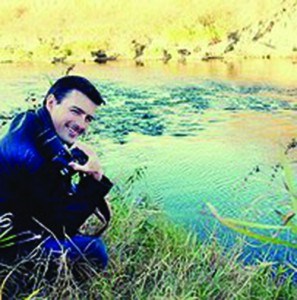
If you’re a male you’ve been told at least once in our life to “toughen up” or “don’t cry.”
To help break the stereotype that men shouldn’t show their emotions, Community Outreach Services has invited Lance Drozda, founder of i.am.heart, to host a public presentation about building emotional empowerment in boys on May 17.
“The work that we do around boys is to try and break the stigma that sensitive or vulnerable emotions are some how gender specific, which they’re not, they’re human-specific,” said Drozda.
He said for boys there’s a stigma around emotions such as sadness, empathy, compassion or kindness, because they are often perceived by society as feminine qualities.
To address that stereotype, Dorzda will explain the stigma that encourages boys to suppress their authentic feelings and provide parents with tools to support boys in recognizing, accepting and expressing their emotions.
He said the root causes of the stereotype are complex, but said part of the problem lies in the notion that men are typically seen as the provider for the family while women are typically seen as the caregiver, reinforcing a stereotype that men have less compassion and empathy than women.
He said this stereotype has been reinforced for generations through media, video games and men themselves.
For example, he said boys at a young age have the same need for physical connection as girls, but because of social pressure have come up with what’s known as the “bro-hug.”
“They’ll hug their classmates, but not too close,” said Drozda “Even at a young age you can see evidence that they are trying to align the human need for connection and physical touch to what’s acceptable and what’s not acceptable from society’s point of view.”
By limiting boys’ ability to express their emotions, it inhibits their ability to understand the world around them.
“The whole thing about emotions is that it gives us information about our environment and our place in it and without using emotions or not being able to fully experience or express them we are kind of turning our back on all of the information the world is giving us,” said Drozda.
“We need that information in order to continue to have happier and healthier lives and to actually connection with other humans.”
To teach boys how to express themselves, he said the very first thing he tells people is that there is no such thing as bad emotions.
“We’ve taught kids that there are good emotions and bad emotions. There are no good or bad emotions, they’re all good,” said Drozda.
He said it’s also important to help children create a language so they can properly express themselves.
“As individuals we know how we feel and in fact we’re probably the only ones who know how we truly feel. The problem with kids, but specifically with boys is not that they don’t know how they feel, the problem is that they don’t have a lexicon or a taxonomy of words to describe it accurately so other people can understand,” said Drozda.
“It’s not about having boys feel more, it’s about giving them the tools to allow them to first understand that expressing emotions is difficult and second of all to help them with the language or terminology for them to understand how they’re feeling and lead that to expression.”
He said part of equipping children with the right tools is also understanding that there is a difference between behaviour and emotions.
“The reason why we separate emotions and behaviour is because all emotions are acceptable and all behaviour isn’t. When we allow kids to fully experience their emotion then we can start to institute corrective behaviour.”
He said when you confuse the two, or treat them as one thing, children try to contain their emotions.
“What I want to get across to kids is that emotions and how we experience emotions is really what makes us unique,” said Drozda.
As for parents he said his underlying message is that emotions are natural.
“As we support kids in the process to feel and express their emotions we create muscle memory in their ability to be more resilient and in that they become more empowered.”
The free workshop will be held on May 17 at the Royal Canadian Legion from 6:30 to 8 p.m. Drozda will also be holding a workshop earlier in the day for students from Grade 5 to 7 as well as staff.
For more information contact Carla Gallop at [email protected].
Paul Clarke
[email protected]
